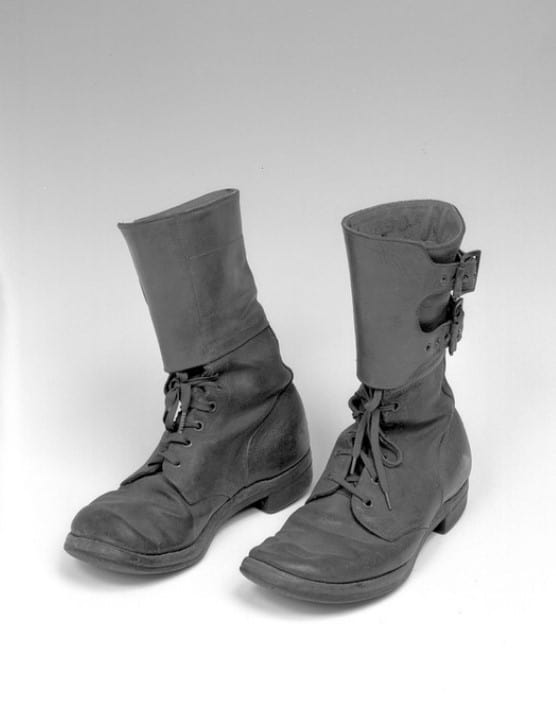
Delbert Cooper was only 21 years old in May 1945. Having enlisted in 1943, he served in the 71st Infantry Division 14th Infantry Regiment, and earned the rank of sergeant.

On May 4, 1945, Cooper was deployed in Combak, Austria, at a repurposed train station. Walking nearby, he stumbled upon a teenage boy. The boy wore a striped uniform, perhaps pajamas. Later, Cooper asked his captain what it was they were looking at. The captain replied, “a concentration camp.”
“I’m going to tell you now; I never want to see a sight again as we saw when we pulled up then,” liberating soldier Delbert Cooper wrote home two days later. The camp he had entered was Gunskirchen, a subcamp of Mauthausen, in Austria. He waded through the muddy camp that day in these brown lace-up combat boots.

Cooper’s infantry battalion had infiltrated a German supply cart to provide food for the newly-liberated prisoners. Over 14,000 “walking skeletons,” as Cooper put it, surrounded him and his fellow soldiers: “Any number of them came up and touched us, as if they couldn’t believe we were actually there. Some of them would try to kiss us even… Some of them would come up, grab you around the neck, and cry on your shoulder. Others would just look and cry. Some of them would throw their arms up in the air and pray.”
Despite witnessing this outpouring, Cooper described people so emaciated as to be alienated from recognizable humanity: “So help me, I cannot see how they stood it. No longer were most of them people, they were nothing but things that were once human beings.”
As the soldiers unloaded the food, Cooper noted a woman crying, gesturing at her mouth to indicate her profound hunger. For many, the thirst was more profound; they sought water before food. Cooper distributed two cans of water per person. It was necessary to ration. He recalled that 500 eggs were divvied first to the children, then the women. Remaining meat went to the men.
“One fellow must have felt that he should give me something,” Cooper wrote. “As he had nothing to give of value, he gave me his little yellow star that designates a Jew.” Cooper mailed the yellow star to his wife for safekeeping, and in his letter suggests she show it to anyone she cares to because “it’s the truth as I saw it with my own eyes.”

The infantry departed the camp, leaving behind provisions to help the survivors. Forging onward to a farmhouse, Cooper encountered a French displaced person who made eye contact with Cooper, held up two fingers, and said “SS.” He guided Cooper to two German soldiers nearby, who were washing their feet. Cooper and his fellow soldiers took the SS soldiers into custody.
The same person then led Cooper to another man who he identified as SS. Cooper questioned the man, bearing his gun. When the man did not respond, Cooper’s finger found the trigger, but he could not kill him. Like the others, Cooper took him into custody.

After the war, Cooper moved to Ohio, where he worked until 1972 at the Defense Electronic Supply Center in Kettering and then moved to Beavercreek. He and his wife Joan had one daughter. Cooper gave multiple interviews about his experiences, including one to the Center for Holocaust Studies, the Museum’s predecessor organization, and another to the United States Holocaust Memorial Museum.
The boots that liberator Delbert Cooper wore on the day of Liberation are on view in our new collection exhibition, The Holocaust: What Hate Can Do.